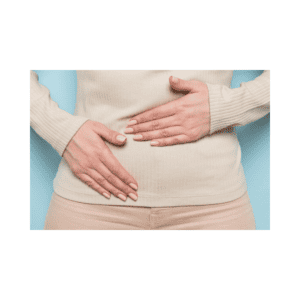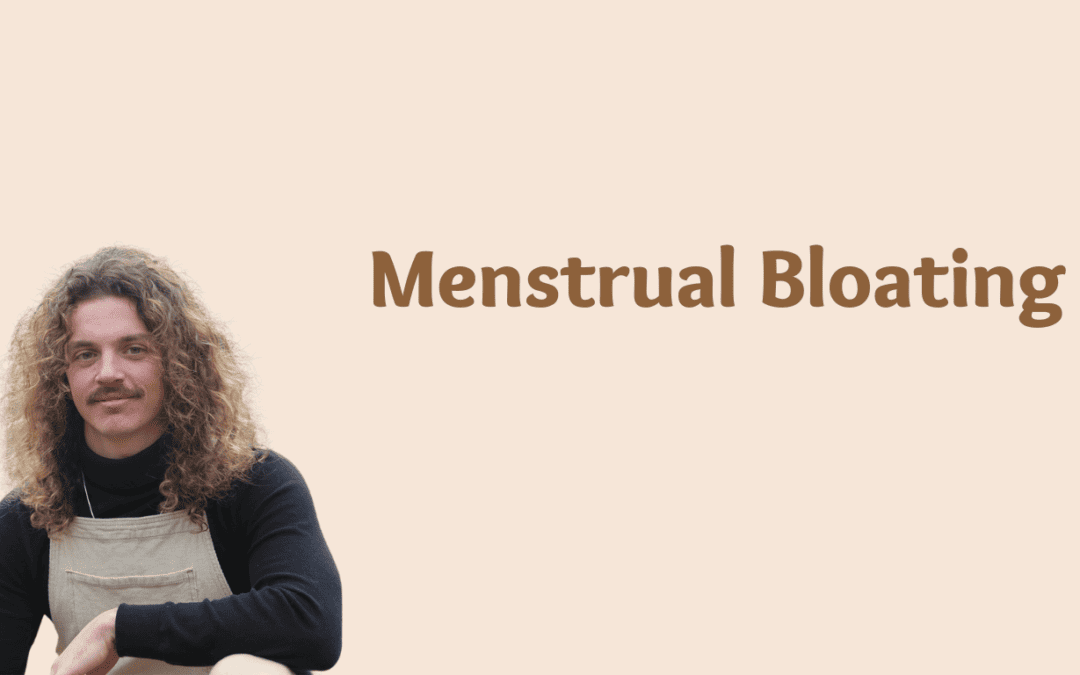What is menstrual bloating?
Menstrual bloating is a common symptom that occurs in the week or days before, or at the start of a period bleed. Most often the bloating is a heavy, swollen sensation in the lower abdomen below the navel, although it can also affect the upper abdomen (just under the ribs) or be generalised to the whole abdomen, and is a symptom that is associated with premenstrual syndrome (PMS).
Other signs of PMS that can occur alongside period bloating are:
- cramping
- headaches
- migraines
- low back pain
- breast tenderness
- mood swings
- irritability
- food cravings
- appetite change
- acne
Why does it happen?
Bloating before the menstrual cycle is linked to changing levels of progesterone and estrogen. Progesterone levels diminish leading up to the cycle, sending a signal to the body to shed the endometrial lining and begin the menstrual bleed. There is some indication that as progesterone and estrogen levels fluctuate it can lead to the retention of water and salt in the body leading to a bloated sensation.
What does Chinese Medicine say about period bloating?
Menstrual bloating and most symptoms of PMS are linked most often to an imbalance of the Liver. The liver regulates the smooth flow of energy and blood in the body. When this function is impaired cramping, swelling, bloating and pain can occur. Chinese medicine also recognises the role the liver has in communicating with the uterus to shed the lining and begin the menstrual bleed. The liver also has a critical role in preserving normal digestive function, when imbalanced this can lead to changes in movement in  the digestive tract, as well as tightening and cramping of tissue. Generally, the week before the cycle will alert us to how your liver is functioning; if it’s overworked by poor diet, stress, and high paced lifestyle then PMS symptoms such as bloating are more likely.
the digestive tract, as well as tightening and cramping of tissue. Generally, the week before the cycle will alert us to how your liver is functioning; if it’s overworked by poor diet, stress, and high paced lifestyle then PMS symptoms such as bloating are more likely.
In acupuncture theory the liver meridian runs through the breasts and rib cage, down through the lower abdomen, the inner thigh and ends at the big toe. This meridian can also show signs of stagnation affecting the liver pre-cycle. This is where breast tenderness and abdominal cramping can manifest as well as bloating.
From a Western medical model, we know that the liver plays a key role in hormone regulation; it metabolises sex hormones such as progesterone and estrogen and ensures they remain at stable levels in the body.
Other organs in the digestive tract can be a factor in pre-period bloating. If the bloating is accompanied by a dull ache in the lower abdomen, low appetite, fatigue and a lack of energy then the small intestine may also be deficient and imbalanced.
What can be done for menstrual bloating?
- Diet: what we eat will have a huge impact on gut and hormonal health. Eat less sugar and processed foods. Eat more good quality fats, protein and complex carbohydrates
- Temperature: cold causes constriction and impacts the flow of blood and fluids in the body-especially in the abdomen and digestive tract. Eating too many cold foods (foods out of the fridge/freezer, smoothies with ice) can cause more bloating and a sluggish digestive system. Smaller, warm and well-cooked meals, warm teas and water are traditionally used in Chinese medicine to help manage bloating.
- Stress management: stress wreaks havoc on our hormonal and digestive systems. Taking time each day to do something that helps your body relax, soften and find a sense of ease is critical to mitigating the effects of stress. Try out meditation, have a warm soak in a bath, or a gentle stroll in nature.
- Exercise: mild to moderate intensity is all that’s required here-think a brisk walk, yoga class, a swim. It’s fantastic for improving circulation, and your metabolism.
- Sleep: high-quality sleep is vital to maintaining hormone health-aim for 7 + hours of unbroken sleep. Aim to be off technology for up to 2 hours before your bedtime.

